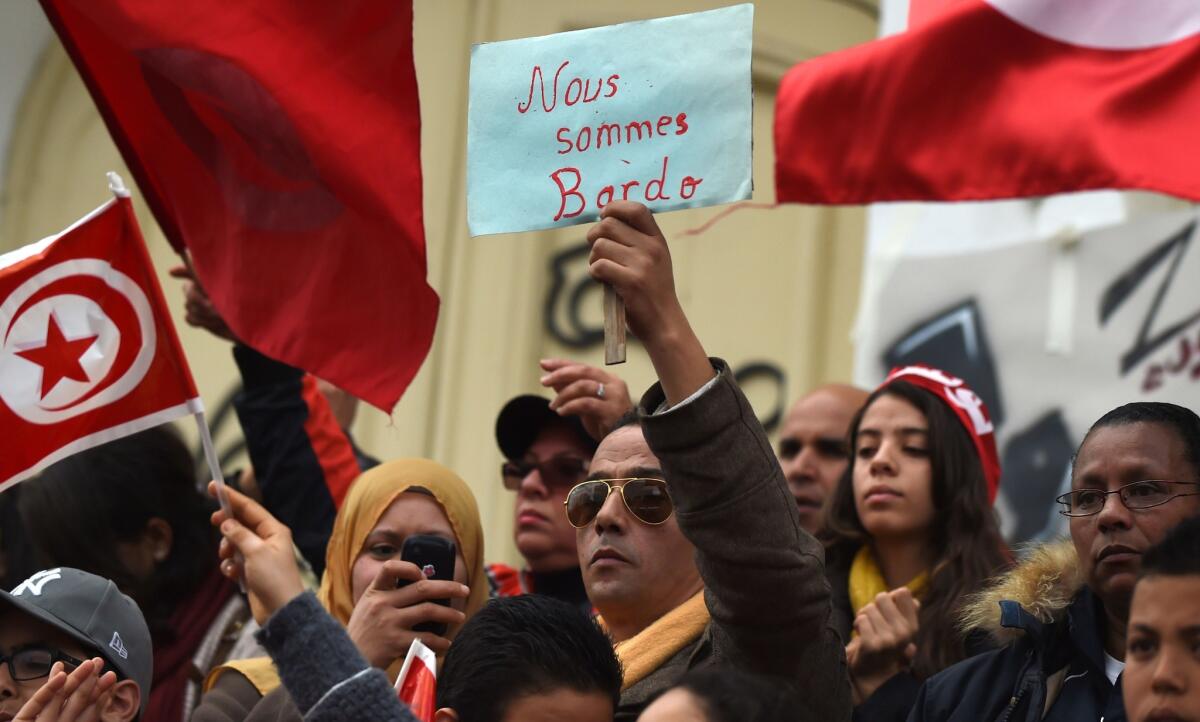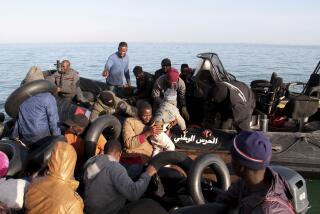Tunisians remember victims of museum attack at holiday rallies

Reporting from Cairo — The gunmen who staged a deadly rampage through a landmark museum in the Tunisian capital this week had been trained at militant camps in Libya, government officials said Friday.
As the death toll in the attack stood at 23, including the two gunmen, Tunisians turned out for rallies to mark what would normally be a festive occasion, Independence Day. Instead, the event was shrouded in gloom, as Tunisians fretted that the blow to tourism would damage their already struggling economy, and that the slaughter raised the specter of more jihadist attacks.
The dead included French, Italian, Spanish, Japanese and British visitors, as well as Tunisian nationals and the two assailants.
Conflicting militant claims about the attack continued to swirl. Islamic State this week sought to claim responsibility, but other groups have also said they carried it out – illustrating the tangle of alliances and rivalries among jihadist organizations that loosely cooperate with one another across the region.
A website that has often announced attacks in Tunisia, Ifriqiyah Media, described the attackers taking the metro to a stop near the National Brado Museum, passing by “infidel barracks” and scouting out a new attack location after deciding that the nearby parliament building was too heavily fortified.
The website said the attackers questioned cornered foreigners about their nationalities before they began “liquidating the infidels,” and claimed guards fled in the face of the assault, although officials have credited museum security with saving and shielding some visitors.
A senior Tunisian security official, Rafik Chelly, told Tunisian television that the two attackers had “managed to sneak into Libya” late last year, and were trained there by jihadists on the use of weapons at bases in or near the eastern city of Benghazi and the coastal city of Derna, a militant stronghold.
The attack was the deadliest since Tunisia’s 2011 uprising, which set off similar revolts across the region. It marked a sobering setback to democratic hopes in the North African country, which had been considered the only Arab Spring success story.
Islamic State, which has attracted many recruits among the estimated 3,000 Tunisians who have gone to fight in Iraq and Syria, threatened more such attacks. Security has been tightened across the country, with military deployments ordered in Tunis and other major cities.
More information began to emerge about the attackers, who were killed, and nine other suspects, four of whom were described by President Beji Caid Essebsi’s office as having been directly linked to the strike and five others with ties to the terror cell that planned it.
One of the attackers, identified as Hatem Khachnaoui, was known to the Tunisian authorities after having been previously picked up on terrorism-related charges. Khachnaoui, from the central town of Sbeitla, was 26; his accomplice, Yassine Labidi, from a poor Tunis neighborhood, was just 20 and was being described by some acquaintances as malleable and naive.
As the cruise ships that had carried most of the victims to a stopover in Tunis arrived in European ports, media in their home countries carried dramatic accounts of their terrifying ordeal. A honeymooning Spanish couple took refuge in a storeroom and listened, quaking, to the sounds of slaughter, the husband, Juan Carlos Sanchez, told Spanish television.
“We were listening to everything that was happening, and waiting for it to be over,” he said.
Times staff writer King reported from Cairo and special correspondent Amro Hassan from Berlin. Staff writer Alexandra Zavis in Los Angeles contributed to this report.
Follow @laurakingLAT on Twitter for news out of the Middle East
More to Read
Sign up for Essential California
The most important California stories and recommendations in your inbox every morning.
You may occasionally receive promotional content from the Los Angeles Times.










